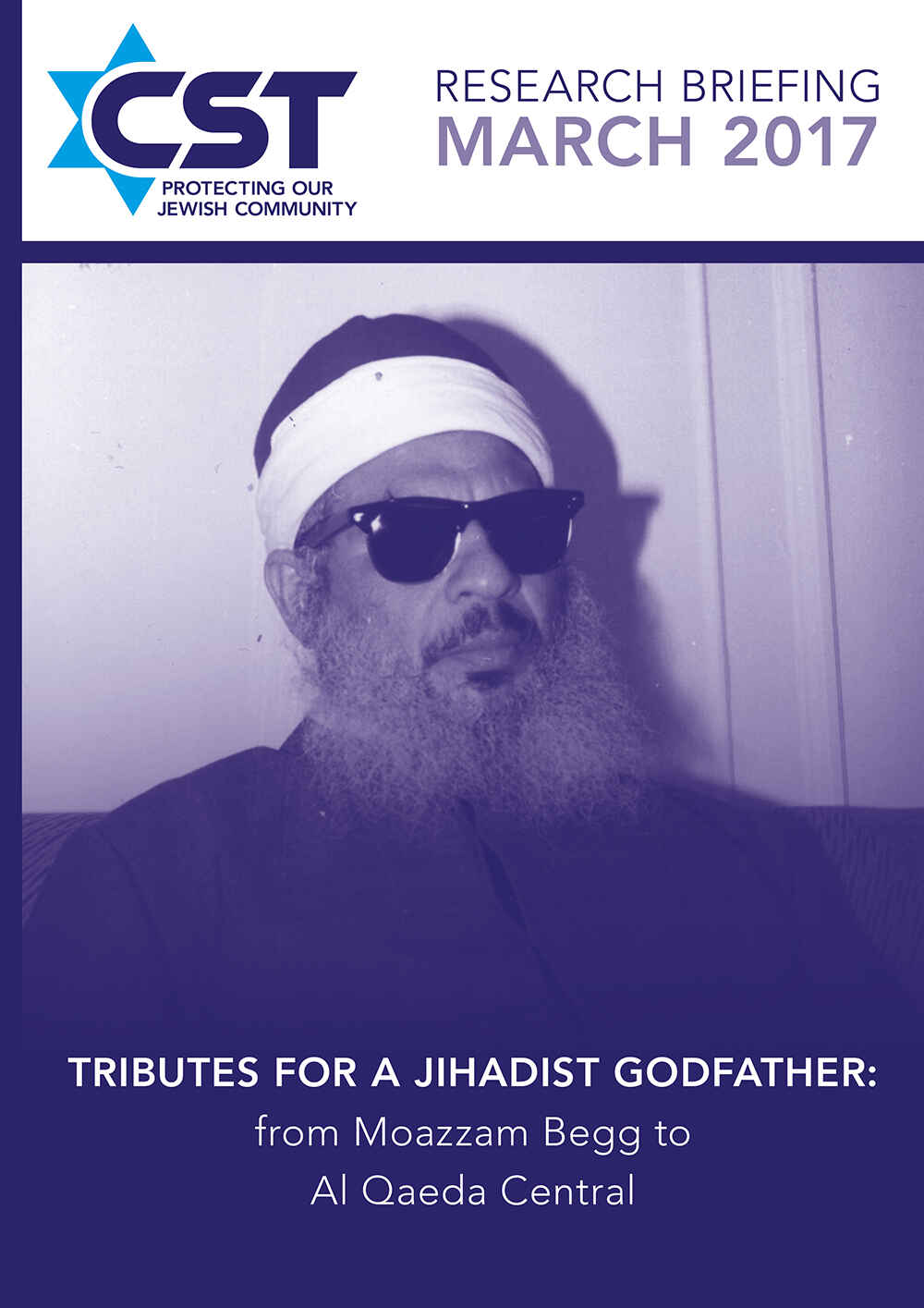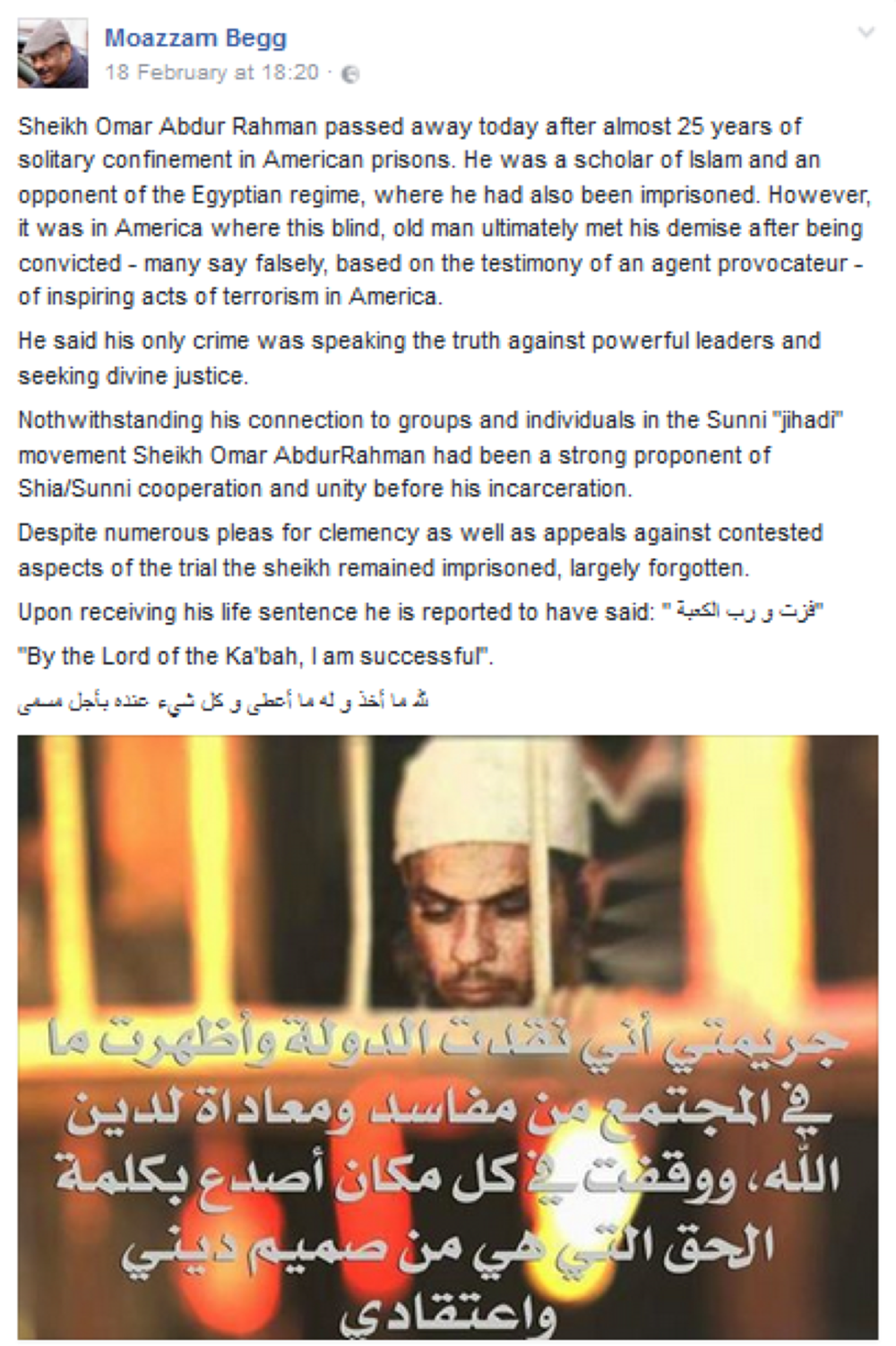CST Blog
Tributes for a Jihadist Godfather: from Moazzam Begg to Al Qaeda Central
28 March 2017
This CST Blog and CST Research Brief (pdf here) was written shortly before the 22 March terrorist attack in Westminster. The content remains unchanged.

Death and martyrdom are key parts of jihadist ideology. It is, therefore, vitally important to note the reactions to the deaths of leading jihadists: whether by actual terrorist groups, or by those British Islamists who push victimhood narratives.
The above image was released by GreenBirdsMedia, an Al Qaeda-linked outlet, after the group’s revered “blind Sheikh” Omar Abdel Rahman recently died in an American prison. A leading jihadist since the 1970s, he was imprisoned on numerous conspiracy charges that included his followers’ role in the 1993 terrorist plot to try and destroy New York’s World Trade Center (using explosives not passenger jets).
As you can see, the Al Qaeda image shows Rahman and the twin towers of the World Trade Center. It calls Rahman “a source of inspiration”, “a great example”, adding, “May Allah have mercy on his soul”.
Globally, Al Qaeda has led the tributes to Rahman, including calls for attacks to avenge his death. In Britain, eulogies came from Moazzam Begg of CAGE, Dilly Hussain of 5 Pillars, the Islamic Human Rights Commission, Fahad Ansari, Sheikh Hani al-Sibai and Sheikh Dr Khaled Fikry.
These non-violent British Islamists do not praise Rahman for his role in terrorism, far less call for revenge attacks. Rather, they vary from claiming his innocence to praising him as a martyr and a unifier of Muslims. They promote Rahman as a Muslim role model and victim par excellence.
The tributes are similar to a crime movie, in which the mafia godfather dies and the FBI inevitably watch his associates gather at the funeral. Some are wanted murderers, others run legitimate businesses. All do their duty, distinguishing themselves from normal society by coming to the funeral like moths to a flame, regardless of reputational risk.
Of course, those dead or in prison cannot publicly mourn. This part is played by the Al Muhajiroun group: previously noisy agitators for Rahman’s release, they are now banned for having been Britain’s leading supplier of Jihadist terrorists to Al Qaeda, Islamic State etc.
Step forward then, Moazzam Begg of CAGE, strongly promoted on and off campus by left-wing and soft Islamist groups, desperate to depict Government anti-extremism initiatives as being anti-Muslim, rather than anti-terrorist and pro-social cohesion.

Similarly, the Islamic Human Rights Commission, but from its pro-Hizbollah and pro-Iranian angle. (Jeremy Corbyn MP attended an IHRC hosted event as recently as December 2016, publicly praised the IHRC in 2010, and led Stop the War during much of its own continuing association with the IHRC.)
Considering Sheikh Rahman’s role in advancing concepts of contemporary violent jihad, as well as his US conviction over bombing conspiracies, the eulogising of this dead leader raises serious concerns and prompts important questions:
Who was Rahman and what is his legacy to jihad and terrorism?
Which British groups have supported Rahman?
Why do British human rights campaigners laud a convicted terrorist revered by al-Qaeda?
The answers detailed in this CST Research Briefing should trouble us all.
Read More

Love since 7 October
14 February 2025

Antisemitic Incidents Report 2024
12 February 2025

The Fall of Assad and the Zionist “Evil Plan”
8 January 2025